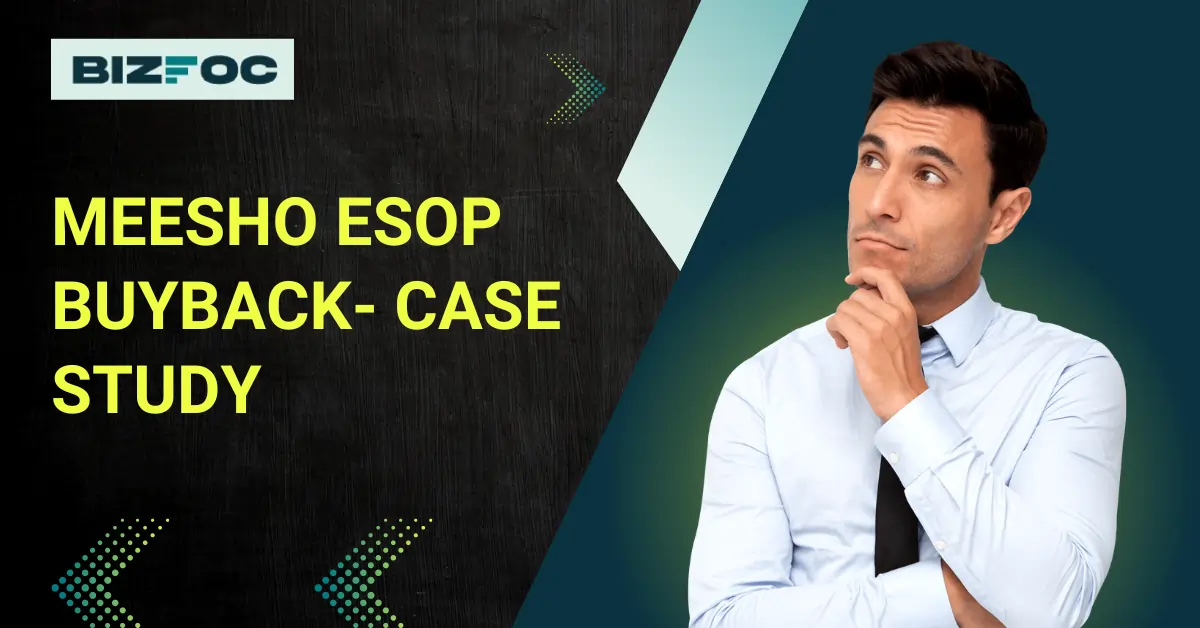Published on: 10 Aug 2024

Meesho, a company headquartered in Karnataka, India, was founded by IIT Delhi Graduates (Vidit Aatrey & Sanjeev Barnwal) in 2015. It has a B2C business model of a social commerce platform that undertakes retail distribution. It provides a platform to small retail merchants to sell their products effectively via connecting to social media channels. Meesho aims to create an environment where anyone can start a business with zero investment. Meesho currently has more than 1000 workers with micro entrepreneurs and manufacturers from more than 500 towns.
Meesho is a start-up with one of the best start-up ecosystems in the Indian market. Many reasons contribute to this fact, including Meesho’s unique ESOP Startup programme.
Meesho focuses on creating wealth not only for senior personnel but for all the employees who add value to the company through their dedicated and unwavering commitment. Hence, ESOP Startup plans are not restricted to any particular designation or seniority of employees which means that ESOPs are granted to all the employees. Key points of Meesho’s ESOP startup structure are outlined below:
Meesho introduced some updates in their ESOP shares structure in April 2022 to enhance the ESOP valuation proposition. The highlights of the changes are mentioned below:
Meesho’s ESOP startup programme is one of the most successful ESOP shares programme in India due to various factors such as:
Most companies generally follow graded vesting, where some percentage of stock options are vested each year spread over a period spreading over 4-5 years, however, Meesho follows a straight-line vesting where stock options are vested at a constant rate each month over a specific period. This creates an advantage that employees do not have to wait for the year to end for their stock options to vest because after completion of the first year, the stock options are vested every month.
Most companies keep their exercise price to be around 25% of the current trading price (for listed companies) or fair value (for unlisted companies). In Meesho, the exercise price is the face value of the shares due to which any benefit arising out of increase in the value of shares in comparison to the face value over the vesting period is enjoyed by the employees.
In many companies, employees can only exercise their ESOP shares after retirement or termination of employment. In the event of termination employees have to convert their options into equity shares within 3 months of exit. In Meesho, employees who leave the organization before vesting of their stock options, are given a time of 10 years, so that they can make sound financial decisions.
Most of the companies issue ESOP shares only to senior personnel whereas in Meesho, the objective of wealth creation across all levels of employees is followed. All the employees are granted ESOPs as an incentive irrespective of any hierarchy.
Not many companies give ESOP buyback options to their employees in the early stage. But Meesho has provided buyback options within three years. The increasing interest in the stock by investors also makes the ESOP valuable.
ESOP Buyback is the process of purchasing back the stocks for a consideration from the employees that they have acquired by exercising the stock options which were earlier granted to them under the ESOP plans. Buyback is not legally binding on employees but is rather an option to them. Many reasons can shape the factors behind ESOP buyback such as providing liquidity to employees, restructuring the ownership or to maintain a proper record of the shareholders. Many brands like Flipkart, Winzo, Tredence etc. announced ESOP Buyback in 2023, which accounted for around INR 6000 cr ($740million) at the onset of the second-half of 2023. One such buyback plan is Meesho’s buyback plan.
Meesho has also done a series of ESOP buyback programs over the last 5 years where they have bought back around a total of Rs 82 cr worth of ESOP shares from the employees.
Meesho launched its first ESOP buyback programme in February 2020 where its existing investors Naspers bought shares worth $1 million (around Rs. 7Cr) in which the option was exercised by 60% of eligible employees and they were allowed to sell up to 30% of their vested shares.
The second ESOp buyback programme was launched in November 2020 where shares worth $5 million (Rs. 37Cr) were bought back. The option was open to eligible existing as well as former employees.
The third ESOP buyback programme, launched in November 2021 involved the buyback of shares valued at $5.5 million (Rs. 42Cr).
The fourth ESOP buyback programme was launched by Meesho in March 2024. It was larger than all previous buy-backs combined and underscored their commitment to rewarding their employees. Meesho targeted to buy back shares with ESOP valuation at $25 million (Rs. 200 Cr). The option was made voluntary for all eligible current and former employees. The programme was launched in March 2024 and aimed to benefit 1,700 employees across all levels from senior leaders to junior positions. The purpose was to provide opportunities of wealth creation for former as well as current employees.
ESOP Buyback is done by a company for several reasons and one such reason is to provide liquidity for the employees and to create wealth for employees and improve their standard of living. Meesho’s ESOP buyback programme constantly revolves around this motive which is demonstrated with its buyback size increasing each time it launches a ESOP buyback programme. Meesho considers its employees as the driving force behind its success. Despite the prevailing macroeconomic conditions, Meesho’s launch of its largest ESOp buyback programme shows its valued ground and relentless efforts to reward employees and foster a culture of growth in the organization.